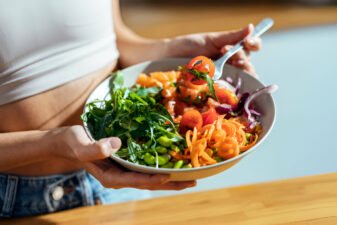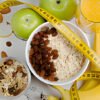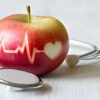A healthy diet is even more essential for women than men. As well as pregnancy, women have to cope with debilitating hormone irregularities which can impact adversely on both health and weight. Healthy eating won’t eliminate or cure these effects, but it often relieves symptoms. It’s worth remembering that some foods – especially fresh fruits and vegetables, contain chemicals which are believed to exercise a powerful beneficial effect on the human body. More research is needed into the effect of these foods (eg. soybeans) to validate these claims, but all dietitians and nutritionists agree that the quality of our daily diet has a huge impact on our health, especially if we are female.
Diet Advice For PCOS
It is thought that up to 10 percent of women may have PCOS, even though many patients may not know it because their symptoms may be misdiagnosed as (eg) PMS or stress. A GI diet is thought to offer the best hope of alleviating symptoms of PCOS. Read more about PCOS below.
Guide to Polycystic Ovary Syndrome
The Role of Insulin in PCOS
Best Diet For PCOS
Low-GI Diet For PCOS
PCOS Diet Menu
PCOS Diet & Lifestyle Studies
Diet Advice For PMS
Pre-menstrual Syndrome (PMS) is a common condition affecting up to 75 percent of women. PMS symptoms vary widely and typically occur up to 14 days before the menstrual period. Diet can be crucial for PMS. The wrong eating habits will definitely aggravate symptoms of PMS. Read more below.
Guide to Premenstrual Syndrome
Healthy PMS Diet and Eating Plan
More About PMS Diet
Problem Foods For PMS Sufferers
PMS Diet Menu
Water Retention And PMS
Water Retention Diet
Diet Advice For Mother and Baby
Diet nutrition is critical to the good health of new moms and infants, both during and after pregnancy. Find answers to questions like: how much weight should you gain during pregnancy, when is it gained, what is the weight used for, what foods, vitamins, minerals and calories should you eat, what foods should you avoid, how to get more help and support. Read more below.
Weight Increase During Pregnancy
Risks of Unhealthy Weight Gain
Health Complications of Obesity For Pregnant Moms
Obesity in Pregnancy: Risk of Birth Defects
Diet Nutrition and Pregnancy
Folic Acid Needs When Pregnant
Iron Needs
Calcium Needs
Nutrition for Expectant Mothers
Foods to Avoid When Pregnant
Nutritional Resources
How to Lose Weight After Pregnancy
How to Control Weight When Breastfeeding
Diet Advice During Menopause
What are the best eating habits to reduce symptoms of menopause? Is mid-life weight gain inevitable? What are the best foods for menopause? Find out why Anne Collins weight control program is so effective for menopausal women. Read more about diet, weight and menopause, below.
Guide to Menopause, Weight & Diet
Best Diet Foods For Menopause
Foods to Restrict During Menopause
Best Vitamins For Menopausal Women
Best Minerals For Menopausal Women
Diet Advice For Fibromyalgia Syndrome
Fibromyalgia syndrome (symptoms include muscle pain and widespread tenderness) is believed to affect 3 to 6 million Americans, 80-90 percent of whom are women. Risk factors for fibromyalgia include stress (the disorder commonly develops during periods of stress), physical trauma, certain rheumatic diseases like rheumatoid arthritis, lupus, or spinal arthritis. Women with a family member who suffers from fibromyalgia are more likely to develop the disorder themselves.
Fibromyalgia Diet Guide
Dietary Guidelines For Fibromyalgia Symptoms
Elimination Diet
Fibromyalgia, Aspartame & MSG
Diet For Rheumatism
Diet Advice For Cellulite Reduction
My advice: eat as healthily as possible, exercise regularly and be happy! This combination might not eliminate your cellulite, but it will help you to live longer, which can be quite useful. Read more below.
Diet for Cellulite
Healthy Eating For Cellulite Sufferers
Foods to Omit When Trying to Reduce Cellulite
Exercise Helps Reduce Risk of Cellulite
Womens Health And The Digestive System
Our food digestion system (mouth, esophagus, stomach, small intestine, large intestine) helps us to absorb energy and nutrients from food. Carbohydrate, fats and protein are each digested differently within the upper gastrointestinal tract, but surplus calories from these three micronutrients are ALL converted to body fat and stored as adipose tissue. Malabsorption in the gut, bad eating habits, viral or bacteriological infections can cause a range of digestive conditions including: Indigestion, Constipation, Diarrhea, Gastroenteritis, and other digestion problems.
For tons of extra weight control advice, see: Weight Loss Help
See also: Body Fat/Adipose Tissue – Why We Gain Fat










